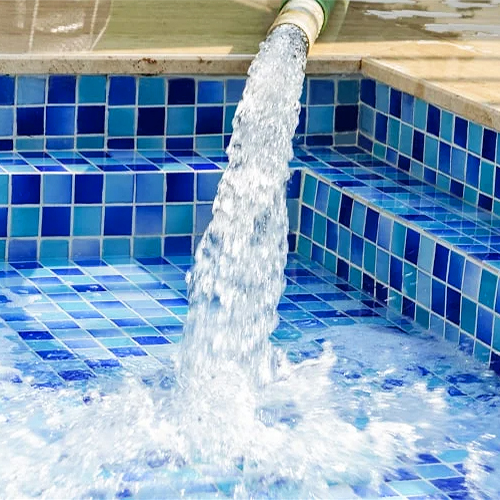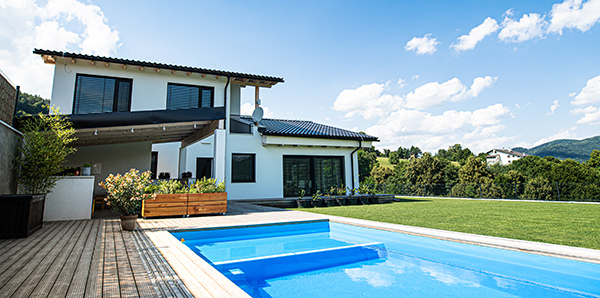Posted by James May on 16th Feb 2022
Above Ground vs In Ground Pool... What's My Best Option?
If you’re thinking about getting a pool for your house, you’ll have to decide which type is right for you. Why should you buy an above ground pool instead of an in-ground pool? Depending on your budget and lifestyle, an above ground pool could be the perfect choice for you.
Above ground pools are cheaper and easier to install than the in-ground varieties. One of the greatest appeals of above ground pools is their practicality. If you’re ready to dive in and get a pool right now, this guide will help you make your decision. There are tons of reasons why you should buy an above ground pool vs. an in-ground pool.
Affordability
Above ground pools are usually less expensive than in-ground pools. Not only are they cheaper to purchase, but they are also more affordable to transport and install. If you’re on a budget, an above ground pool might be the best option for you.
There are three main price points to consider when buying a new above ground pool. The overall cost will include the price of the pool kit, the installation, and any decking or additional features. The purchasing cost of an above ground pool is typically between $3,000–$7,000 and the installation costs are generally between $1,000–$5,000. The cost of decking, ladders, heaters, and other features will vary depending on what you need. Overall, the average price to purchase and install an above ground pool is $4,000–$15,000. If you purchase your pool in the fall or winter when demand is low, you can get an even better deal at a more affordable price.
On the other hand, in-ground pools are significantly more expensive. The average cost to install an in-ground pool is between $30,000–$70,000. The price of excavation, durable materials, and installation adds up to thousands of dollars.
Water Usage

If you’re concerned about water usage, an above ground pool will probably be a better choice for you than an in-ground pool. Although both options require a great deal of water, there are several ways that you can limit your use of the resource. There are two key factors that come into play here that make above ground pools more appealing.
The main reason that above ground pools use less water than in-ground pools is because most models can be drained and stored when not in use. If your pool is properly stored away, you won’t use any water or incur any running costs at all. The other reason that above ground pools use less water is because they are more limited in their size, shape, and depth. The amount of water needed for an in-ground pool could be massive depending on the overall volume of the pool.
Cleaning & Maintenance
It is extremely important to ensure that your pool is always properly cleaned and maintained. Whether you have an above ground pool or an in-ground pool, the hygiene of your water is vital. Buying a filtration system and cleaning chemicals will add to your costs, but will ensure that your pool stays safe, clean, and undamaged. Since above ground pools are generally smaller in size, they will inherently require less maintenance. However, it’s important to remember that above ground pools are constructed with less durable materials and could be damaged more easily. If there are major holes, cracks, or tears in your above ground pool, you may need to replace the entire thing. Prevent unnecessary repair or replacement costs by regularly checking for signs of aging and wear.
The size of your swimming pool can also determine which style of filtration system will work best.
Click Here to learn the differences between Sand & Cartridge Filtration Systems!
Setup & Storage
Above ground pools are easier to set up and install than in-ground pools. Furthermore, there’s much less commitment associated with above ground pools. Whenever you desire, you can break down your above ground pool to move it somewhere else or store it away. This flexibility is especially appealing in the winter or if you’re moving to a new house.
Running Costs
Along with being cheaper to purchase and install, above ground pools also have more affordable running costs. The main costs to consider are associated with electricity, water, cleaning, and maintenance. Both types of pool will incur regular costs, but above ground pools are less expensive in the long run.
One of the most significant costs over time will be for resources like water and power. Owning either type of pool can greatly increase your utility bills. Pools need electricity to run the heaters, pumps, filters, cleaners, thermometers, and more. Above ground pools use less water and power since they are typically smaller and easier to heat. In-ground pools often need more electricity to operate since they are larger and tend to come equipped with more advanced devices.
Along with utilities, there are other running costs to consider. With either type of pool, you will need to buy cleaning chemicals, filters, cleaning equipment, and products for making repairs. The costs associated with maintenance and upkeep will almost always be more affordable for an above ground pool. In-ground pools may be more durable, but they are also larger and more expensive to maintain.
Resale Value

Many people mistakenly believe that an in-ground pool will automatically increase the value of their property. However, the reality is that adding a pool won’t add automatic appraisal points to your home. In fact, you could even end up making your house less desirable and harder to sell. An in-ground pool is a bad investment if you’re looking to increase your resale value. While owning an above ground pool also won’t add value to your home, it can’t hurt your resale value. Above ground pools are easy to break down and remove from the property if desired.
Longevity
There are many reasons that you should buy an above ground pool vs. an in-ground pool, but unfortunately, longevity is not one of those reasons. In-ground pools are more durable and have a significantly longer lifespan than above ground pools. Above ground pools are temporary products that are intended to be replaced. However, it’s important to remember that the longevity of in-ground pools is dependent on regular and often expensive maintenance.
The average above ground pool has a lifespan of 7–15 years when properly maintained. The liners of the pool typically need to be replaced every 5–9 years for ideal results. The durability and structural integrity will largely depend on the materials used.
In-ground pools have greater longevity than above ground pools, although this is contingent on the materials used. Fiberglass pools will last for 20–25 years if they are maintained at least every 10 years. Pools constructed from plaster or concrete have an even longer lifespan than that if they are regularly resurfaced. Most in-ground pools can last for well over 50 years if properly maintained.
Are Above Ground Pools Worth It?
There are tons of reasons why you should buy an above ground pool vs. in-ground pool. If you want to get a pool installed quickly on a tight budget, an above-ground pool may be the best option. Above ground pools have more affordable running costs, easier setup, and simpler maintenance. Furthermore, they use less water and power and won’t negatively affect your house’s resale value. Even though in-ground pools last longer, the drawbacks outweigh the benefits. If you’re thinking about getting a pool for your house, consider buying an above ground pool instead of an in-ground pool!
About the Author:
JAMES MAY
James is the Head of Content & Multimedia for PoolSpaZone & Revenew Group.
With a background in copywriting and graphic design, his new obsession is complete mastery of the pool and spa industry!

